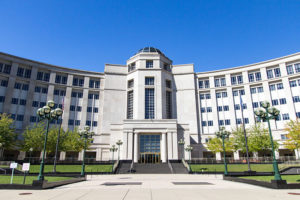New COVID-19-Related Orders Extend Delays and Changes to the Michigan Court Rules
 Michigan’s courts are currently closed for in-person matters in all but emergency situations. Each local jurisdiction has been trying to better utilize technology so the litigation can continue, even if it must be done remotely or from a distance. The use of two-way video conferencing has been a boon, and e-filing documents where possible has cut down on face-to-face interactions significantly.
Michigan’s courts are currently closed for in-person matters in all but emergency situations. Each local jurisdiction has been trying to better utilize technology so the litigation can continue, even if it must be done remotely or from a distance. The use of two-way video conferencing has been a boon, and e-filing documents where possible has cut down on face-to-face interactions significantly.
While Governor Whitmer has extended the stay-at-home order further in our state, the Michigan Supreme Court issued two new administrative orders – AO 2020-7 and AO 2020-8 – to address service issues and upcoming trials.
Temporary Amendments and Extensions to Some Michigan Court Rules
The courts have been directed to proceed with hearings and activities remotely as much as possible, utilizing technology wherever feasible. To that end, the Michigan Supreme Court has made some changes that temporarily should ease access to the courts:
- MCR 2.002: Courts must allow a party seeking a fee waiver to do so electronically.
- MCR 2.107(C): Because mail may not be received due to the stay-at-home order, all service of process must be performed using electronic means (e-filing in Courts that have it, email, and fax) to the greatest extent possible.
- MCR 2.305, 2.506, 2.621: Subpoenas issued under these rules may require a party to appear by phone, video, or another remote participation tool.
The Supreme Court’s goal is clearly to make it easier for not just attorneys, but also the public to interact with the courts. These measures should make it easier to conduct civil cases, particularly as it makes the subpoena process safer and more readily available.
All Jury Trials Postponed
Under Administrative Order No. 2020-10, and pursuant to the Michigan Constitution, the Supreme Court is exercising its superintending control to mandate a delay of all jury trials for at least 60 days – no earlier than June 22, 2020. If a jurisdiction sets a local order extending that delay, then the local order will control.
To ensure the public’s safety and observe social distancing norms, the Supreme Court also authorized the Supreme Court Administrative Office to initiate pilot projects on how best to conduct remote jury trials. It will be a significant change if such pilot programs are successful, but the Supreme Court is working to find any means possible to continue court operations.
Speak with the Litigators at Kreis Enderle
If you are concerned about how these new orders might affect your case or claim during the COVID-19 stay-home order, the litigation attorneys here at Kreis Enderle are ready to counsel you throughout these ever-shifting times. Like the courts, we are working remotely and utilizing phone and video conferencing to communicate with clients.